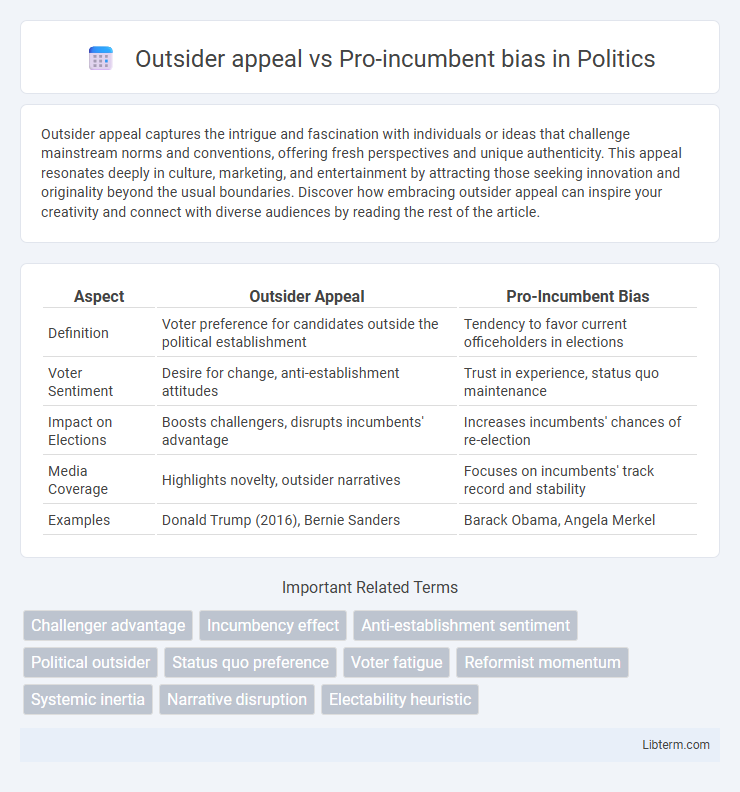Outsider appeal captures the intrigue and fascination with individuals or ideas that challenge mainstream norms and conventions, offering fresh perspectives and unique authenticity. This appeal resonates deeply in culture, marketing, and entertainment by attracting those seeking innovation and originality beyond the usual boundaries. Discover how embracing outsider appeal can inspire your creativity and connect with diverse audiences by reading the rest of the article.
Table of Comparison
| Aspect | Outsider Appeal | Pro-Incumbent Bias |
|---|---|---|
| Definition | Voter preference for candidates outside the political establishment | Tendency to favor current officeholders in elections |
| Voter Sentiment | Desire for change, anti-establishment attitudes | Trust in experience, status quo maintenance |
| Impact on Elections | Boosts challengers, disrupts incumbents' advantage | Increases incumbents' chances of re-election |
| Media Coverage | Highlights novelty, outsider narratives | Focuses on incumbents' track record and stability |
| Examples | Donald Trump (2016), Bernie Sanders | Barack Obama, Angela Merkel |
Understanding Outsider Appeal
Outsider appeal stems from candidates perceived as independent from established political institutions, which fosters public trust among voters dissatisfied with incumbents. This phenomenon often challenges pro-incumbent bias, where electorates favor sitting officials due to perceived experience or stability. Analyzing voter behavior reveals that outsider appeal can erode traditional party loyalty, especially in contexts of political polarization or corruption scandals.
Defining Pro-Incumbent Bias
Pro-incumbent bias refers to the tendency of voters or stakeholders to favor current officeholders or established authority figures during elections or decision-making processes. This bias often manifests in the form of preferential treatment, higher trust, or perceived competence attributed to incumbents, overshadowing challengers' appeal. Understanding pro-incumbent bias is critical to analyzing electoral dynamics where outsider appeal struggles against entrenched political advantages.
Historical Context: Outsiders vs Incumbents
Historical context reveals that outsider appeal often surged during periods of political frustration, such as the post-Watergate era or the 2016 U.S. presidential election, when voters sought alternatives to traditional power structures. Pro-incumbent bias typically manifests in stable political climates where institutional trust is high and incumbents have established name recognition, resources, and a track record to leverage. Empirical studies show incumbents win re-election approximately 90% of the time in the U.S. House, demonstrating entrenched advantages despite periodic outsider surges linked to broader social or economic discontent.
Psychological Drivers Behind Outsider Appeal
Psychological drivers behind outsider appeal include a perception of authenticity and a desire for change when established institutions are viewed as corrupt or ineffective. Voters often associate outsiders with innovation and independence, contrasting with pro-incumbent bias, which favors stability and proven experience due to risk aversion. Cognitive biases such as the negativity bias amplify support for outsiders by highlighting incumbent failures and fostering distrust in the status quo.
Advantages of Pro-Incumbent Bias
Pro-incumbent bias advantages include fostering political stability by reducing frequent leadership changes and promoting policy continuity, which can enhance long-term economic planning and governance efficiency. Incumbents often benefit from greater access to resources and established networks, enabling more effective crisis management and constituent services. This bias also helps maintain institutional knowledge and experience, facilitating smoother transitions and consistent implementation of government programs.
Media Influence on Outsider Narratives
Media influence significantly shapes outsider appeal by amplifying narratives that challenge established political norms, increasing visibility and support for non-traditional candidates. Conversely, pro-incumbent bias in media coverage often downplays outsider perspectives by prioritizing stability and existing power structures, limiting equal exposure. This dynamic creates a media environment where outsider narratives struggle to gain traction against the institutional advantages afforded to incumbents.
Case Studies: Outsider Success Stories
Outsider appeal often challenges pro-incumbent bias by presenting candidates who leverage public dissatisfaction to win elections, as seen in the 2010 Tea Party wave where newcomers like Rand Paul secured Senate seats. Case studies demonstrate that outsider success hinges on effective messaging that contrasts their platforms with entrenched incumbents, capitalizing on voter desire for change. Examining the 2016 U.S. presidential election reveals how Donald Trump's outsider status disrupted traditional pro-incumbent advantages, reshaping campaign strategies nationwide.
Risks and Challenges of Incumbency
Incumbents face risks such as voter fatigue and perceived complacency, which can fuel outsider appeal by promoting fresh alternatives to entrenched power. Pro-incumbent bias often skews media coverage and resource allocation, masking underlying dissatisfaction and creating challenges in addressing genuine public concerns. This dynamic complicates campaign strategies, as incumbents must overcome both entrenched expectations and emerging calls for change.
Impact on Voter Behavior
Outsider appeal often energizes disillusioned voters by presenting candidates as alternatives to the political establishment, increasing voter turnout and shifting preferences toward non-traditional options. Pro-incumbent bias leads to greater support for sitting officials due to name recognition, perceived experience, and the status quo advantage, often suppressing the momentum of challengers. The interplay between these forces shapes electoral dynamics by balancing voter desire for change against comfort with proven leadership.
Future Trends in Political Alignment
Future trends in political alignment suggest a growing outsider appeal as voters seek alternatives to established incumbents, driven by widespread dissatisfaction with traditional governance. Pro-incumbent bias remains resilient in certain demographics where stability and experience are prioritized, yet increasing polarization and social media influence amplify support for outsider candidates. Demographic shifts and evolving policy priorities will likely reshape the balance between outsider appeal and pro-incumbent bias in upcoming election cycles.
Outsider appeal Infographic

 libterm.com
libterm.com